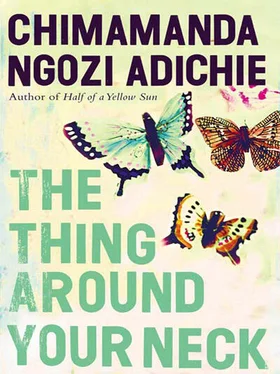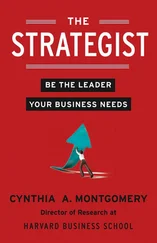Two days ago she had buried her child in a grave near a vegetable patch in their ancestral hometown of Umunnachi, surrounded by well-wishers she did not remember now. The day before, she had driven her husband in the boot of their Toyota to the home of a friend, who smuggled him out of the country. And the day before that, she hadn’t needed to take a passport photo; her life was normal and she had taken Ugonna to school, had bought him a sausage roll at Mr. Biggs, had sung along with Majek Fashek on her car radio. If a fortune-teller had told her that she, in the space of a few days, would no longer recognize her life, she would have laughed. Perhaps even given the fortune-teller ten naira extra for having a wild imagination.
“Sometimes I wonder if the American embassy people look out of their window and enjoy watching the soldiers flogging people,” the man behind her was saying. She wished he would shut up. It was his talking that made it harder to keep her mind blank, free of Ugonna. She looked across the street again; the soldier was walking away now, and even from this distance she could see the glower on his face. The glower of a grown man who could flog another grown man if he wanted to, when he wanted to. His swagger was as flamboyant as that of the men who four nights ago broke her back door open and barged in.
Where is your husband? Where is he? They had torn open the wardrobes in the two rooms, even the drawers. She could have told them that her husband was over six feet tall, that he could not possibly hide in a drawer. Three men in black trousers. They had smelled of alcohol and pepper soup, and much later, as she held Ugonna’s still body, she knew that she would never eat pepper soup again.
Where has your husband gone? Where? They pressed a gun to her head, and she said, “I don’t know, he just left yesterday,” standing still even though the warm urine trickled down her legs.
One of them, the one wearing a black hooded shirt who smelled the most like alcohol, had eyes that were startlingly bloodshot, so red they looked painful. He shouted the most, kicked at the TV set. You know about the story your husband wrote in the newspaper? You know he is a liar? You know people like him should be in jail because they cause trouble, because they don’t want Nigeria to move forward?
He sat down on the sofa, where her husband always sat to watch the nightly news on NTA, and yanked at her so that she landed awkwardly on his lap. His gun poked her waist. Fine woman, why you marry a troublemaker? She felt his sickening hardness, smelled the fermentation on his breath.
Leave her alone , the other one said. The one with the bald head that gleamed, as though coated in Vaseline. Let’s go .
She pried herself free and got up from the sofa, and the man in the hooded shirt, still seated, slapped her behind. It was then that Ugonna started to cry, to run to her. The man in the hooded shirt was laughing, saying how soft her body was, waving his gun. Ugonna was screaming now; he never screamed when he cried, he was not that kind of child. Then the gun went off and the palm oil splash appeared on Ugonna’s chest.
“See oranges here,” the man in line behind her said, offering her a plastic bag of six peeled oranges. She had not noticed him buy them.
She shook her head. “Thank you.”
“Take one. I noticed that you have not eaten anything since morning.”
She looked at him properly then, for the first time. A nondescript face with a dark complexion unusually smooth for a man. There was something aspirational about his crisp-ironed shirt and blue tie, about the careful way he spoke English as though he feared he would make a mistake. Perhaps he worked for one of the new-generation banks and was making a much better living than he had ever imagined possible.
“No, thank you,” she said. The woman in front turned to glance at her and then went back to talking to some people about a special church service called the American Visa Miracle Ministry.
“You should eat, oh,” the man behind her said, although he no longer held out the bag of oranges.
She shook her head again; the pain was still there, somewhere between her eyes. It was as if jumping from the balcony had dislodged some bits and pieces inside her head so that they now clattered painfully. Jumping had not been her only choice, she could have climbed onto the mango tree whose branch reached across the balcony, she could have dashed down the stairs. The men had been arguing, so loudly that they blocked out reality, and she believed for a moment that maybe that popping sound had not been a gun, maybe it was the kind of sneaky thunder that came at the beginning of harmattan, maybe the red splash really was palm oil, and Ugonna had gotten to the bottle somehow and was now playing a fainting game even though it was not a game he had ever played. Then their words pulled her back. You think she will tell people it was an accident? Is this what Oga asked us to do? A small child! We have to hit the mother. No, that is double trouble. Yes. No, let’s go, my friend!
She had dashed out to the balcony then, climbed over the railing, jumped down without thinking of the two storeys, and crawled into the dustbin by the gate. After she heard the roar of their car driving away, she went back to her flat, smelling of the rotten plantain peels in the dustbin. She held Ugonna’s body, placed her cheek to his quiet chest, and realized that she had never felt so ashamed. She had failed him.
“You are anxious about the visa interview, abi ?” the man behind her asked.
She shrugged, gently, so as not to hurt her back, and forced a vacant smile.
“Just make sure that you look the interviewer straight in the eye as you answer the questions. Even if you make a mistake, don’t correct yourself, because they will assume you are lying. I have many friends they have refused, for small-small reasons. Me, I am applying for a visitor’s visa. My brother lives in Texas and I want to go for a holiday.”
He sounded like the voices that had been around her, people who had helped with her husband’s escape and with Ugonna’s funeral, who had brought her to the embassy. Don’t falter as you answer the questions, the voices had said. Tell them all about Ugonna, what he was like, but don’t overdo it, because every day people lie to them to get asylum visas, about dead relatives that were never even born. Make Ugonna real. Cry, but don’t cry too much.
“They don’t give our people immigrant visas anymore, unless the person is rich by American standards. But I hear people from European countries have no problems getting visas. Are you applying for an immigrant visa or a visitor’s?” the man asked.
“Asylum.” She did not look at his face; rather, she felt his surprise.
“Asylum? That will be very difficult to prove.”
She wondered if he read The New Nigeria , if he knew about her husband. He probably did. Everyone supportive of the pro-democracy press knew about her husband, especially because he was the first journalist to publicly call the coup plot a sham, to write a story accusing General Abacha of inventing a coup so that he could kill and jail his opponents. Soldiers had come to the newspaper office and carted away large numbers of that edition in a black truck; still, photocopies got out and circulated throughout Lagos — a neighbor had seen a copy pasted on the wall of a bridge next to posters announcing church crusades and new films. The soldiers had detained her husband for two weeks and broken the skin on his forehead, leaving a scar the shape of an L. Friends had gingerly touched the scar when they gathered at their flat to celebrate his release, bringing bottles of whiskey. She remembered somebody saying to him, Nigeria will be well because of you , and she remembered her husband’s expression, that look of the excited messiah, as he talked about the soldier who had given him a cigarette after beating him, all the while stammering in the way he did when he was in high spirits. She had found that stammer endearing years ago; she no longer did.
Читать дальше











